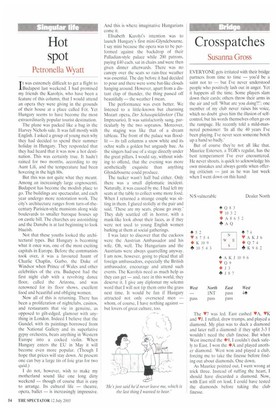Hot spot
Petronella Wyatt
It was extremely difficult to get a flight to Budapest last weekend. I had promised my friends the Karolyis, who have been a feature of this column, that I would attend an opera they were giving in the grounds of their house at a place called Ht. Yet Hungary seems to have become the most extraordinarily popular tourist destination.
The plane was packed like a bag in the Harvey Nichols sale. It was full mostly with English. I asked a group of young men why they had decided to spend their summer holiday in Hungary. They responded that they had heard that it was now a hot destination. This was certainly true. It hadn't rained for two months, according to my Aunt Lili, and the temperature had been hovering in the high 80s.
But this was not quite what they meant. Among an increasingly large cognoscenti, Budapest has become the modish place to go. The buildings are spectacular, and each year undergo more restoration work. The city's architecture ranges from turn-of-thecentury Parisien-style mansions along wide boulevards to smaller baroque houses up on castle hill. The churches are astonishing and the Danube is at last beginning to look blueish.
Not that these youths looked the architectural types. But Hungary is becoming what it once was, one of the most exciting capitals in Europe. Before the communists took over, it was a favoured haunt of Charlie Chaplin, Garbo, the Duke of Windsor when Prince of Wales and other celebrities of the era. Budapest had the first night club with a revolving dance floor, called the Arizona, and was renowned for its floor shows, excellent food and beautiful and obliging women.
Now all of this is returning. There has been a proliferation of nightclubs, casinos, and restaurants that vie in genuine, as opposed to gilt-edged, glamour with anything in London. Indeed I believe that the Gundel, with its paintings borrowed from the National Gallery and its superlative gypsy orchestra, beats anything in Western Europe into a cocked violin. When Hungary enters the EU in May it will become even more popular. (Though I hope that prices will stay down. At present one can buy a large tin of foie gras for two quid.) I do not, however, wish to make my motherland sound like one long dirty weekend — though of course that is easy to arrange. Its cultural life — theatre, opera, ballet — is increasingly impressive. And this is where imaginative Hungarians come it.
Elisabeth Karolyi's intention was to launch Hungary's first mini-Glyndebourne. I say mini because the opera was to be performed against the backdrop of their Palladian-style palace while 200 patrons, paying £40 each, sat in chairs and were then given dinner afterwards. There was no canopy over the seats so rain-free weather was essential. The day before it had decided to pour and there were some bat-like clouds hanging around. However, apart from a distant clap of thunder, the thing passed off beautifully — the weather I mean.
• The performance was even better. We listened to a little-known but charming Mozart opera, Der Schauspieldirektor (The Impresario). It was satisfactorily sung, particularly by the two sopranos. Moreover, the staging was like that of a dream tableau. The front of the palace was floodlit — its tall columns a snow white and its ochre walls a golden but ungaudy hue. As the singers had use of a stage directly under the great pillars, I would say, without wishing to offend, that the evening was more aesthetically exquisite than anything Glyndebourne could produce.
The tucker wasn't half bad either. Only there was a small diplomatic incident. Naturally, it was caused by me. I had left my seats at the table to collect some more food. When I returned a strange couple was sitting in them. I glared stolidly at the pair and said, 'These are my seats, please go away.' They duly scuttled off in horror, with a mask-like look about their faces, as if they were not used to young English women barking at them at social gatherings.
I was later to discover that the cuckoos were the Austrian Ambassador and his wife. Oh, well. The Hungarians and the Austrians were always quarrelling anyway. I am now, however, going to plead that all foreign ambassadors, especially the British ambassador, encourage and attend such events. The Karolyis need as much help as they can get — and, rare in this world, they deserve it. I give any diplomat my solemn word that I will not tip them onto the grass next time. It would be fun if Hungary attracted not only oversexed men — whom, of course, I have nothing against — but lovers of great culture, too.


































































 Previous page
Previous page